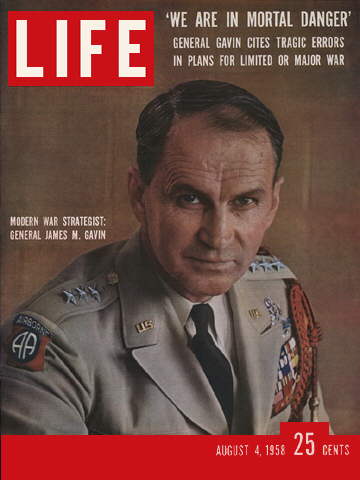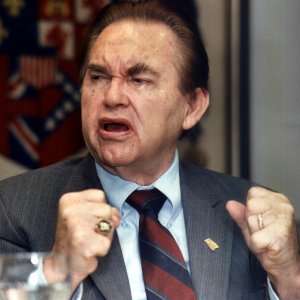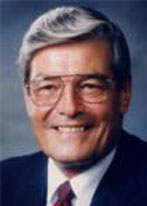Wouldn't Wallace be weakened, even among his base, for the same reason as McGovern? Voters will be reminded that if it hadn't been for George's little vanity campaign, McKiethen would be President and We Could Have Avoided All This. I'm a little surprised it didn't come up in his re-election campaign, but I suppose the old bastard has enough dirt on everyone in Alabama to scare off any serious challengers -- but I suspect he's toast in the rest of the country.
Challenged on this point Wallace might well retort that he was chosen as a candidate by a plurality (if not a majority) of Alabama voters, and that his Electors stood-up for the sovereign rights of the State of Alabama against those who would force the power of the federal government down their throat.
That would be his campaign theme inside Alabama in 1974, and I don't think he would have any serious challengers who could knock him off the in the Democratic primaries (still the real Alabama election at this time) - certainly not like his close contest with Albert Brewer in 1970.
Outside Alabama, when challenged, he Wallace could argue that he stood-up for the principles of his State and the ones he had run on; he wouldn't be captured by the "Washington deal making machine." He stood fast for his beliefs, and it was because the others wouldn't compromise with him that the election went to the Congress.
ITTL: Wallace might say:
"George Wallace didn't hang-up the 1972 general election, and don't you listen to jimmer-jammer that says otherwise. No sir. I stood for the solid values and principles which I gave to you through my whole campaign, and the one before that. I spoke for those who have no other voice. I took nine Electoral Votes to Washington so that those unheard voices could at last be heard in the highest forum of our land.
"Make a deal with President Nixon, they said. Give your votes to Governor McKeithen they said. Why? So we could have an easy election? And what would we elect? Tweedle-dee or tweedle dum? Cause I guarantee you, if I had given my vote to either Nixon or McKeithen that's we'd have got. President Tweedle-dee in bed with the fat cats and profiteers; or President Tweedle-dum ready to expand big government to take over more of your life?
"If I had allowed that, then you could have said to me, George, why'd you sell us out? Why'd you let the country down? 'Cause then I would surely have been a lowly skunk - a sell out!
"When I went to school I read about some very brave men who said no to that kind of chicken-hearted, mealy mouthed, oatmeal flavored get-along-to-go-along kind of bull. They were our founding fathers, who made a nation where that should never happen. A free nation. A nation that believes in things and calls on all its citizens to defend that.
"Well, my friends, I defended that in a war, and I have stood for liberty and freedom all my life. So when you ask me, why didn't you sell out in 1972 just to make the problem go away, I'll say back - George Wallace doesn't sell out! George Wallace believes in the Constitutions and our freedoms guaranteed by that sacred piece of paper. George Wallace will fight to the end for what he believes - and that is freedom and the rights of our people to enjoy that freedom.
"If you don't like that, go to ...well, somewhere hot. George Wallace ain't gonna sell himself for your vote; I ain't for sale! But if you believe with me that our Constitution, or country is sacred, and our values are worth fighting for, then you know I will fight for that until the last breath leaves my body. So help me God!"
George C. Wallace - March 11, 1975











